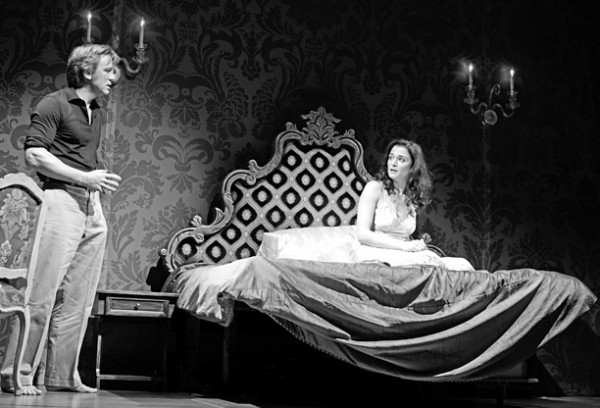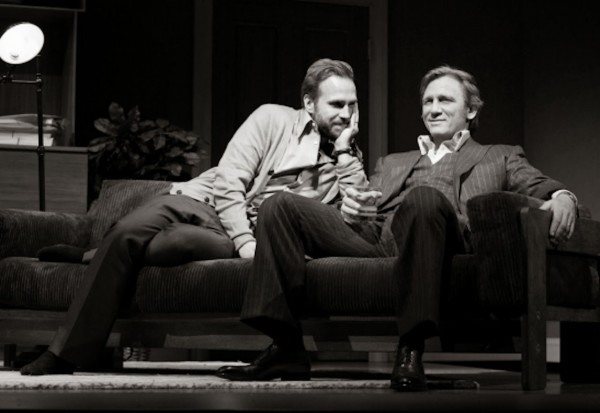
Robert (Daniel Craig) and wife Emma (Craig’s real-life wife, Rachel Weisz) don’t spend a lot of time together in bed in BETRAYAL (photo by Brigitte Lancombe)
Ethel Barrymore Theatre
243 West 47th St. between Broadway & Eighth Ave.
Through January 5, $67 – $185
www.betrayalbroadway.com
Harold Pinter’s Betrayal has always been a star-driven vehicle. The reverse-chronology tale of marital infidelity opened on Broadway in 1980 with Raul Julia, Blythe Danner, and Roy Scheider and was revived in 2000 with Liev Schreiber, Juliette Binoche, and John Slattery; the 1983 film featured Jeremy Irons, Patricia Hodge, and Ben Kingsley. In its current incarnation on Broadway, directed by Mike Nichols, the husband-and-wife team of Daniel Craig and Rachel Weisz might be driving ticket sales through the roof, but it’s Rafe Spall who ends up stealing the show. Spall plays Jerry, an impulsive arts agent who has had a long affair with gallery owner Emma (Weisz), who is married to one of his closest friends, refined publisher Robert (Craig, who resembles Kirk Douglas here); Jerry was even best man at their wedding. The play begins in 1977, as Jerry, who is married to the never-seen Judith, and Emma meet in a bar so Emma can tell him that she had no choice but to finally confess their affair to Robert the previous night. But as Jerry finds out when he sees Robert later that day, Robert has actually known about their lengthy indiscretion for several years, which infuriates Jerry. The story continues in backward order, going from Jerry and Emma’s breakup in 1975 to the night he professes his love for her at a party in 1968. (However, multiple scenes within the same year move forward.)

Jerry (Rafe Spall) and Robert (Daniel Craig) reminisce over better times in second Broadway revival of Harold Pinter play (photo by Brigitte Lacombe)
Nichols, who helmed a marvelous revival of Death of a Salesman last year with Philip Seymour Hoffman, keeps things relatively simple in this even-keeled, somewhat subdued production. In his Broadway debut, Spall (Life of Pi, Prometheus) injects fiery life into the wildly unpredictable Jerry, while Craig (A Steady Rain, Bond, James Bond) and Weisz (The Constant Gardener, 2010 Olivier Award for A Streetcar Named Desire), in her Broadway debut as well, give their characters a dispassionate coldness that wavers a little too much in intensity, occasionally playing it too matter-of-factly. The staging matches the emotional temperature: As scenes fade out, somber piano music by former LCD Soundsystem head James Murphy tinkles over the loudspeaker, the actors glide offstage on Ian MacNeil’s rotating sets, and backdrops float in and out from above. Of course, Jerry is the meatier role; Emma and Robert’s marriage is cold and dispassionate from the start of the play, but Weisz’s and Craig’s performances still can feel a bit distant at critical moments. Based on his own affair with Joan Bakewell, Pinter’s thirty-five-year-old Olivier Award–winning drama retains a timeless quality, as Nichols focuses on the hearts and minds involved in a classic love triangle, avoiding the impulse to ground the play in any specific era by steering clear of overt references to the sociopolitical climate or even the clothing of the day. It might not be as stirring as it could have been, but this Betrayal offers an honest, penetrating examination of complex adult relationships.